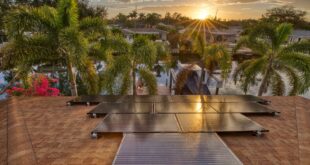Compared with many other states, Maryland offers solid incentives to help residents, especially low-income households, save on solar panels or connect to solar farms.
In fact, Maryland has state incentives that run the gamut from sales and property tax exemptions to net metering policies, which allow homeowners with solar panel systems installed to send excess energy to the grid during peak sunlight hours in order to pull energy from the grid later.
But there’s more to consider beyond just deciding to go solar. You have to choose what that system will look like, whether to include a battery and who should do the installation. These are tough decisions. Here’s how to find the best solar company for you in Maryland, along with what information you need to make the right choices.
The best national solar panel installation companies in Maryland
As residential solar continues to grow in popularity, the number of solar installers should increase to meet demand. More choices mean you have plenty of options when choosing a solar installer, but it can also mean sorting through a large number of options.
To help you narrow it all down, we’ve compiled a list of solar panel company standouts to consider.
Palmetto Solar
Best overall
Solar panels are typically low maintenance equipment, but they’re also unfamiliar. If you want to reap the benefits of solar but will have a bit more peace of mind if someone else is making sure it’s working, Palmetto might be a good fit for you. Just remember to add the cost of Palmetto’s monitoring service in to your payback period calculations.
Solar Energy World
Best warranty
Solar Energy World isn’t a national player, but it shouldn’t be overlooked if you’re on the East Coast. The company has a long history of solar installations, an extremely generous warranty period, and positive customer reviews. You can choose from tier-one rooftop solar panels from brands like QCells, Silfab, and Longi, along with battery and inverter choices from SolarEdge and Enphase.
EnergyPal is more than just a middleman. It’ll handle your solar installation from beginning to end while also allowing you to benefit from its proprietary engine and competitive bidding process. The company offers a range of hardware for panels, batteries and inverters, has plentiful financing options and offers responsive customer service support.
Freedom Forever
Best for cash customers
Include Freedom Forever in your search if you want the backing of a national company that installs a wide variety of the most popular solar equipment available. Freedom Forever also extends a couple of products that take some of the pain and risk out of going solar, like a production guarantee and an escrow option with cash purchases. Online reviews say customer satisfaction has been low of late, though the company says that’s changing.
Tesla Solar
Most affordable
Tesla’s solar branch seems to be the least loved of Elon Musk’s ventures. Even Tesla’s Solar Roof seems to get more love.
If price is the thing you won’t budge on, consider Tesla. By all accounts, Tesla installs quality panels and makes the closest thing there is to a household name in solar storage: the Powerwall.
Where you might miss out is customer service. Discussion online seems to suggest Tesla’s service is a bit of a gamble.
How to determine which solar company in Maryland is best for you
Getting solar panels is a big investment and a major home improvement, so treat it with care. You’ll want to identify several companies that can do the job. Start by asking people you know who’ve gone solar which installer they used and what their experience was like. As you develop your list, consider customer reviews, warranties and equipment.
Once you have a handful of companies in mind, get quotes from each one. Make sure they visit your home and provide an estimate for a system based on your house and your individual energy needs and desires. Remember this is a big, long-term investment, so the best price may not mean the best fit.
Cost of solar panels in Maryland
Here’s a look at the average cash price for a typical solar panel system before factoring in tax credits and incentives, according to data from FindEnergy.com.
Average cost of solar panels in Maryland
| Typical system size (kW) | Price per watt | Total installed cost | Cost after 30% federal tax credit | |
| Maryland | 5 | $3.49 | $17,450 | $12,215 |
| National average | 5 | $3.58 | $17,900 | $12,530 |
The following map of the US displays the average total cash price, cost per watt and typical system size for solar panel systems in different states, according to data from FindEnergy.com. These prices don’t account for any potential savings from tax credits or state incentives. Certain states don’t have any FindEnergy solar data and are grayed out on the map.
Solar incentives and rebates in Maryland
Maryland offers many incentives and breaks for a solar panel purchase, along with other solar initiatives to help offset the rising cost of household energy.
Installing solar could help relieve costly home energy bills, and federal, state and local incentives are making solar panels more affordable.
The Maryland Energy Administration offers grants to low-income households to help them go solar. “Adding these solar energy systems to homes across the state will help lower energy costs to some of the most economically vulnerable Marylanders,” Mary Beth Tung, director of the MEA, said in a press release.
Maryland recently passed a bill becoming the 23rd state to adopt a “shared-access” community solar program. The new framework will replace the former community solar program that was capped at 580 megawatts.
“As Maryland marches towards its goal of achieving 100% clean energy by 2035, the community solar program will increase the availability of solar energy, reduce costs for those who most need the cost savings, and create jobs and apprenticeships,” Kim Coble, executive director of the Maryland League of Conservation Voters, said in a May 2023 press statement.
The residential clean energy credit is a federal solar tax incentive offering 30% of the cost of a solar system in a tax credit to consumers who install solar panels in 2022 and after. Previously known as the investment tax credit, this incentive was increased from 26% to 30% and extended in August 2022 when the Inflation Reduction Act passed.
There is no cap on how much you can claim with the residential clean energy credit, so you can receive 30% of the cost of your system no matter its size or price. You can apply by filling out IRS form 5695 (PDF). The IRS has provided instructions on how to fill out the form and submit the application. After the application is approved, you receive the 30% in credit when you file your tax return.
Maryland solar incentives
| Program | Description |
|---|---|
| Low Income Solar Grant Program | The Maryland Energy Administration offers this grant program on a first-come-first-serve basis to assist qualified low-income households with the cost of design and installation of solar panels. Read more details on this grant program. |
| Net metering | Net metering lets you send excess solar energy generated by your system back to the power grid in exchange for credit on your electricity bills. |
| Property tax exemption | Installed solar panels normally increase a home’s value, which typically leads to higher property taxes. In Maryland, residents who own solar panels are exempted from paying increased state and local property taxes. |
| Residential Clean Energy Rebate Program | Residents who install a solar panel system smaller than 20 kW receive a $1,000 rebate. |
| Sales tax exemption | Residents who buy solar panels don’t have to pay sales and use tax on their system. |
| Solar renewable energy certificates (SRECs) | For each megawatt-hour of solar energy your panels produce, you gain one SREC. You can sell these credits to electricity suppliers or utilities in the SREC market. The price per SREC depends on supply and demand, so the value can change from year to year. |
| Community Solar Pilot Program | Access renewable energy benefits at all income levels without the commitment of buying and owning solar panels with a subscription to a community solar program. |
How solar-friendly is your state?
CNET recently ranked states based on their residential solar policies: the laws and regulations affecting consumer-level solar panel installation and adoption. These policies play a major role in determining how accessible and affordable a solar panel system is to the average resident.
Each state was evaluated through a methodology and scored based on eight categories. The final score was converted to a letter grade.
Here’s how your state scored on CNET’s solar policy test.
Maryland
Grade: B
Incentives available:
- $1,000 capped rebate for solar system installation
- Retail rate net metering
- Solar panel systems fully exempt from property taxes
- Solar panel systems fully exempt from sales tax
- Statewide low-income rooftop solar and community solar programs
Strongest scoring categories:
The Old Line State makes top marks in a lot of the key categories that save homeowners money on their solar installation in both the short term and the long term, including net metering and property and sales tax exemptions. The state also has a large solar carveout in its renewable energy portfolio and a mandate for statewide community solar generation capacity.
Categories to improve:
Maryland has a state tax credit — the $1,000 rebate — which is better than nothing, but it’s still a weak incentive considering a typical solar panel system installation in the state costs tens of thousands of dollars.
Installation factors to consider
Choosing to invest in solar panels is a big investment, whether you purchase your system or lease it. It’s important to consider whether solar is the right choice for your home. Some questions to ask yourself beforehand include:
- Is my roof right for solar? The size, shape and slope of your roof will have an impact on your solar system’s efficiency. According to the Department of Energy, solar panels will produce more electricity when installed on a roof with a slope between 15 and 40 degrees. You should also consider the age and condition of your roof before installing solar panels. If your roof is older or in need of repairs, it will need to be maintained or replaced before installation.
- Will my insurance cover solar panels? Most standard homeowner’s policies cover rooftop solar panels, but you should contact your homeowner’s insurance company to check the details of your policy. After installing solar panels, contact your agency to add the panels to your policy.
- Does my neighborhood allow solar panels? Maryland has a solar rights law, meaning homeowner’s associations and neighborhoods cannot ban solar panels installations. There may be requirements or regulations in place, however, regarding the visibility, aesthetics or wiring of a solar panel system. Be sure to research the requirements in your area before installing solar panels.
- Is my location right for solar? Maryland normally has about 202 sunny days per year, just under the US average of 205. Maryland receives more rainfall every year compared to the rest of the country, too. While solar panels can still generate electricity in indirect sunlight, they’re much more efficient when they get at least 4 hours of direct sunlight per day. Homes in Maryland that receive a lot of rain may not be able to produce as much solar power as a home in Florida, where sunshine is abundant. You should also consider your home’s shade coverage when thinking about solar.
- What if I rent my home? If you rent your home or live in an apartment, you may not be allowed to install solar panels. Check with your rental management company or landlord to confirm if solar is allowed. If not, community solar may be a good alternative. Maryland offers a community solar pilot program, which allows residents who rent their home to benefit from solar power. With community solar, you pay a monthly fee to subscribe to solar energy produced at another location and receive a credit on your energy bills. The subscription fee is set at a lower rate than the value of the credits, meaning you typically come out ahead financially. Maryland’s community solar program is geared towards helping low and moderate income residents benefit from solar energy savings, opening up solar to a wider range of households.
- Do you plan to move? If you anticipate moving to a new home in the future, consider whether it makes financial sense to invest in solar panels in your current home. If you move to a new home, you’ll likely need to leave your solar panels behind because it can be very difficult and expensive to remove and reinstall them. Solar panels can increase your home’s value by up to $15,000, according to the Department of Energy, so your investment can pay off if you plan to sell. If you move to a new home before recouping your investment, however, the increased home value might not be enough to cover the upfront cost.
How we found the best solar companies
The companies we listed above as “the best” are curated from CNET’s best solar companies list. Companies making the best list are scored on the equipment, warranties and customer service they offer. Then, we make sure these recommendations are available in your state. You can read a full breakdown of how we review solar companies here.
Companies listed under the local installers were chosen in a less rigorous way. We chose them because they offered something unique or notable to customers in the state, they seemed well-regarded by internet reviewers or because they were one of the few installers we could find information on in the state.
Whether we’ve completed a full review on a company or not, it’s always a good idea to get multiple quotes from different installers before choosing a company.
FAQs
How long do solar panels last?
On average, solar panels last between 25 and 30 years. Over time, your solar panels’ performance will decrease, which is why installers and manufacturers warranty a panel’s efficiency and performance for a certain number of years. The lifespan of your solar panels will depend on the quality, climate and maintenance. If they are well-maintained and of good quality, they could last more than 30 years.
How can I find the right Maryland solar installer?
With a growing number of solar installers operating in Maryland, it can be tricky to narrow down your options. If you are searching for a Maryland solar installation company, we recommend getting quotes from multiple installers, reading customer testimonials and reviewing the warranty information for every product. You can use CNET’s picks for top solar companies as a starting point.
 synnbiob
synnbiob


